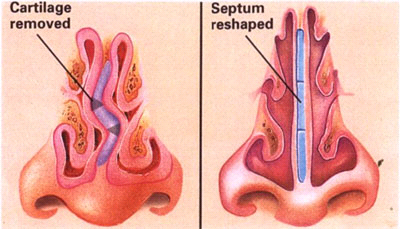Nasal septoplasty and turbinate reduction surgery
Nasal septoplasty and turbinate reduction surgery are commonly performed procedures. They are performed by ear nose and throat surgeons to alleviate breathing problems. Patients who are experiencing chronic nasal congestion, blocked breathing through their nose, nosebleeds, sinus infections, and/or problems breathing at night should see an ENT specialist.
In many people, the cause of a blocked nose is from a deviated septum and/or turbinate enlargement.
The nasal turbinates are structures in the nose that act to filter and keep the nasal passages clean as air passes through. When the nasal turbinates are enlarged beyond normal size, a blocked nose can result. A deviated nasal septum can also cause nasal blockage. The nasal septum is the thin wall of cartilage and bone that separates the right and left nasal passages. If your nasal septum deviates from the center of your nasal passages, then you may have problems breathing. By straightening the nasal septum with septoplasty and reducing the size of the turbinates through turbinate reduction surgery, most patients breath better.
Nasal septoplasty and turbinate reduction surgery are usually performed under a general anaesthetic – so you’ll be asleep for the surgery. Septoplasty and turbinate reduction surgery can also be performed together with rhinoplasty, sinus surgery and other procedures as needed.
Recovery after surgery includes avoiding strenuous activities for around two weeks after the septoplasty and turbinate reduction surgery. Ice packs will also help to reduce swelling and pain felt after surgery. Your ENT Surgeon will have additional advice as needed. It is important to follow to ensure best results. The outcome after surgery depends on both the surgery itself and post-surgery care. You should only use the pain relief medication that your surgeon and anaethetist prescribe. For instance certain pain medication such as aspirin, nurofen and voltaren will increase the risk of bleeding. If you follow the advice of your doctors after surgery this will help your recovery process. It is also important to follow up with post-operative visits to your ENT doctor to ensure that you are healing properly. You will need to call to arrange these appointments after surgery.

